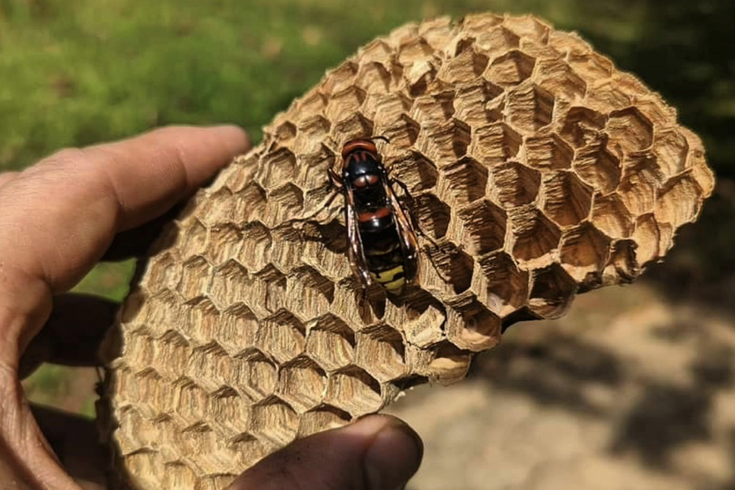
September 25, 2023
 Philadelphia Bee Co./Facebook
Philadelphia Bee Co./Facebook
A queen European hornet is shown on a piece of nest removed last week by Philadelphia Bee Co. A thief stole the vacuum used to flush out and trap the hive, owner Don Shump said.
Philadelphia may have a Darwin Award candidate who's either in a world of pain or about to be.
Last Thursday night, a thief stole a vacuum from the back of a Ford pickup truck that belongs to Don Shump, owner of Philadelphia Bee Co. The 11-year-old business specializes in relocating honey bees from their nests and removing various species of wasps from properties where they're not wanted. The stolen vacuum contained hundreds of European hornets.
All of Philadelphia Bee Co.'s removals are chemical-free; Shump and his crew use vacuums to suck up the insects before their nests are removed.
Shump got a call last Thursday to remove a nest of European hornets from a property in Malvern. The invasive species is a type of wasp that produces large queens this time of year; only a tiny percentage of them survive to hibernate and create new nests in the spring. European hornets are especially feisty when threatened with a vacuum.
"They have a tendency to climb out of the hose, so even with the hose plugged up, they were trying to get out," Shump said Monday morning. "I just left the vacuum in the truck bed overnight, which I normally don't do. People in my neighborhood don't bother my stuff. They know I'm the beekeeper around."
Shump's new work truck, which does not yet display the Philadelphia Bee Co. logo, was parked near his home in Frankford. When he woke up the next day, he saw a vacuum was missing from his truck and posted an open letter to the thief on Facebook.
"To the poor soul who lifted the shop vac out of the back of my truck, I wanted to give you a heads up ... The vacuum was there because it was filled with European hornet queens, the largest social stinging insects in the eastern United States," Shump wrote. "I performed the removal of their nest late yesterday afternoon. Those girls should be full of life and extra spicy. I anxiously await your unboxing video."
At this time of year, with temperatures cooling, European hornets can survive for days in a vacuum like the one that was stolen. Usually, Shump gets calls to remove yellow jackets, bald-faced hornets and paper wasps. European hornets are a rare job.
"I might get three of their nests a year," Shump said. "The over-under on this person grabbing that vacuum on that day, that's more than a one-in-100 shot."
Shump shared a video of what awaits the thief when the vacuum's hose is removed from its holder. He suspects at least half of the hornets in there are queens.
"They're significantly bigger. The queens are probably equivalent in size to the murder hornets that everybody was talking about a few years ago, the giant hornets in the northwest U.S.," Shump said. "I call them false murder hornets. We started getting a ton of calls from people losing their minds, and every one was either a cicada killer or a European hornet."
The sting of a European hornet is roughly as painful as a sting from a honey bee, but unlike honey bees, they're capable of stinging multiple times.
Normally, Shump would have put the European hornets in an ice chest and then had them pinned for entomological study. Now he's picturing the nightmarish scene when the thief tries to make use of the vacuum.
"Bees and wasps are the most f*** around and find out animals on the planet," Shump said.
Philadelphia Bee Co. does hundreds of removals each year. Honey bees, which are a hugely important and threatened part of our ecosystem, are relocated to apiaries around the city, including ones at Shane Confectionary in Old City, above the main branch of the Free Library of Philadelphia and at the Academy of Natural Sciences. Philadelphia Bee Co. harvests the bees' honey and sells it online.
The 14th annual Philadelphia Honey Festival was held earlier this month at Wyck Historic House and Bartram's Garden. Each year, Shump wows attendees by allowing a swarm of bees to form a "beard" on his uncovered face.
"This time of year we're gearing up for the Christmas Village, so we'll sell our honey there," Shump said. "We're restocking on our spotted lanternfly honey, and then we'll do some harvest on our Philadelphia locals."
The stolen vacuum, which cost about $110, isn't really a concern to Shump.
"It's not going to make or break us, but it's one of those situations where it couldn't have been worth it for this person with what they ended up with," he said. "I don't need it back, but (the thief should) just put it down wherever it is and don't open it. I still have wasps from that removal that are alive, so maybe give it a week to be safe."